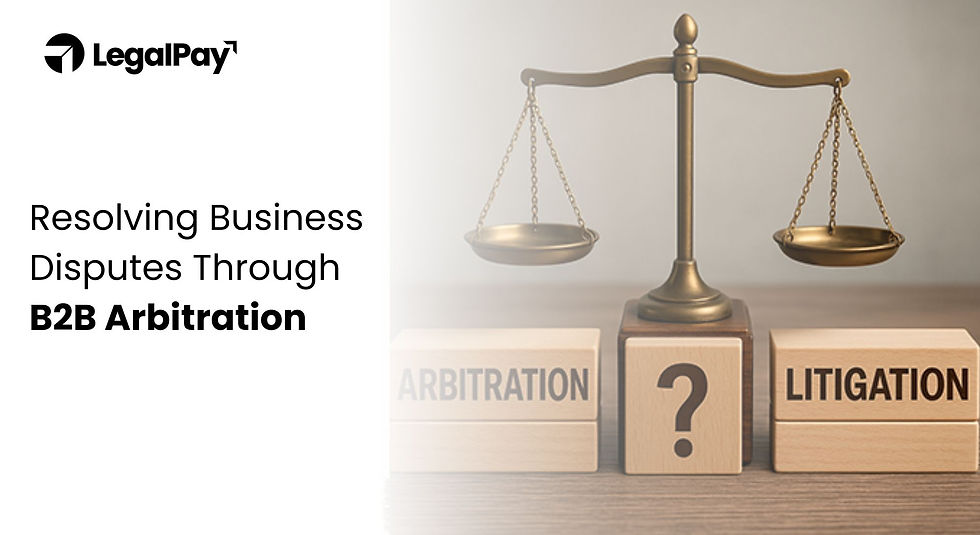Demystifying Legal Finance: Key Steps to Obtain Legal Funding
- LegalPay

- Jan 9, 2024
- 3 min read
Updated: Jan 11, 2024

Introduction
Legal finance, also known as litigation financing, has gained popularity as a means for plaintiffs to secure funding for civil and commercial lawsuits. Despite its growing prevalence, this industry remains a mystery for many legal professionals and plaintiffs. This article aims to demystify legal financing by providing a comprehensive guide on the key steps plaintiffs need to take to obtain funding for various types of lawsuits.
What is Legal Finance?
In essence, legal finance involves third-party financing companies providing funds to plaintiffs to cover the costs associated with pursuing a lawsuit. This includes attorneys' fees, court costs, expert witness fees, and living expenses during the case. In return for the upfront capital, the financing company receives a predetermined portion of the lawsuit's proceeds if the case succeeds.
Lawsuits Eligible for Legal Financing
Legal financing is applicable to a broad range of lawsuits, including personal injury, employment discrimination, commercial disputes, and intellectual property cases. Any civil lawsuit with potential damages sufficient to justify financing costs may qualify for legal financing.
Key Steps to Obtain Legal Financing
If you're a plaintiff considering legal financing, here are the crucial steps to follow:
Research Financing Companies
Thoroughly research available legal financing firms.
Compare approval rates, speed, reputations, and the percentage of proceeds they take.
LegalPay, India’s largest litigation funding provider, has emerged as a pioneer in the Indian market.
Estimate Your Case Value
Provide an estimate of your lawsuit's potential value to determine if funding makes business sense.
Gather Case Documentation
Collect necessary documentation, including demand letters, liability arguments, and damages calculations.
Apply for Funding
Complete application forms and participate in interviews.
Authorize access to documentation from your attorneys.
Get Offers and Compare Terms
Compare offers side-by-side, scrutinizing percentage of proceeds, implied interest rates, and conditions.
Benefits of Legal Financing
Legal financing provides several benefits for businesses navigating legal disputes:
Reduced Cash Flow Pressures
Leveling the Legal Playing Field
Pursuing Worthwhile Claims More Freely
Strategic Risk Transfer
Preserving Capital for Growth Plans
Conclusion
In conclusion, legal financing is a pivotal resource for plaintiffs navigating the complexities of civil and commercial lawsuits. As the industry gains prominence, understanding its nuances becomes crucial for legal professionals and litigants alike. The outlined key steps serve as a comprehensive guide for plaintiffs seeking financial support in their legal pursuits.
By exploring the benefits of legal financing, we uncover its transformative potential for businesses. From alleviating cash flow pressures to leveling the legal playing field, the advantages are manifold. Legal financing not only serves as a financial lifeline but also empowers businesses to pursue valid claims, uphold justice, and strategically manage their resources.
In a world where legal disputes are inevitable, legal financing stands as a beacon of support, ensuring that justice is not compromised due to financial constraints. As we move forward, the synergy between legal expertise and financial support will continue to redefine the dynamics of litigation, making legal financing an indispensable tool for those seeking a fair and equitable resolution to their legal endeavors.
Frequently Asked Questions (FAQs)
1. What is legal financing, and how does it work?
Legal financing, also known as litigation financing, involves third-party companies providing funds to plaintiffs to cover the costs of pursuing a lawsuit. This includes attorney fees, court costs, and living expenses. In return, the financing company receives a predetermined portion of the lawsuit's proceeds if successful.
2. Are all types of lawsuits eligible for legal financing?
A wide range of lawsuits, including personal injury, employment discrimination, commercial disputes, and intellectual property cases, may qualify for legal financing. The eligibility often depends on the potential damages award and the justification for financing costs.
3. How do I choose the right legal financing company?
When selecting a legal financing company, consider factors such as approval rates, processing speed, reputation, and the percentage of proceeds they take. Thoroughly research available options and compare terms to make an informed decision.
4. What documents do I need to provide during the legal financing application process?
During the application process, you'll need to provide documentation explaining your legal claim. This may include demand letters, liability arguments, damages calculations, and any other relevant information that supports your case.
5. Can legal financing be used for any stage of a lawsuit?
Legal financing can be applied for at various stages of a lawsuit, from the initial filing to the conclusion of the case. However, the timing may impact the terms of the financing, so it's essential to discuss this with the financing company.
6. How is the potential value of my lawsuit determined?
Financing companies may ask you to estimate the potential value of your lawsuit if successful. This estimate helps them assess whether funding the case makes business sense. It's crucial to provide a realistic and well-supported valuation.




Comments